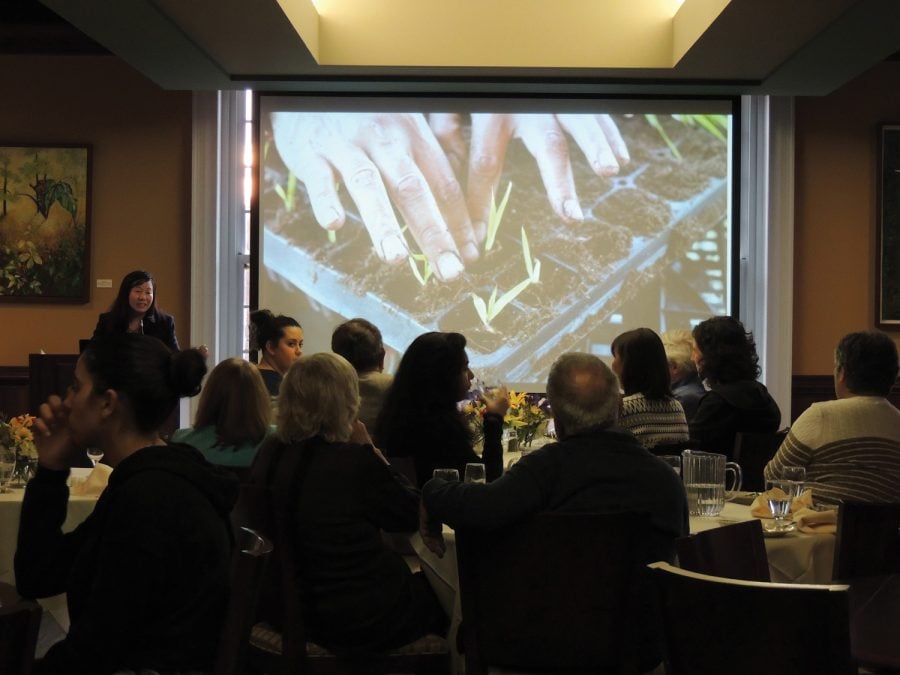Katy Chang shares EatsPlace experience as part of Women in Economic Development Series
“Food brings us all together,” said Katy Chang, founder, chef and CEO of EatsPlace.
On Friday, March 29, Chang held a keynote presentation in the Gilmer Room of Founders Hall as the final speaker in this year’s Women in Economic Development Series. This series allowed many members of the Guilford community to collaborate and bring several women to speak to students.
“This evening (marks) our fourth and final community discussion in our Women in Economic Development Series,” said Director of the Center for Principled Problem Solving Mark Justad. “The series was directed by Sonalini Sapra, and co-taught by Krista Craven and Nancy Daukas with assists from Zulfiya Tursunova and Betty Kane, as well as several students.”
EatsPlace is a community development financial institution in Washington D.C. that works to provide tools to entrepreneurs in order to allow them to design local foods and food systems that benefit both the environment and local communities.
“One of the things we focus on here at the Center (for Principled Problem Solving) is ‘transforming passion into action,’” Justad said.
During her visit at Guilford, Chang held a community lunch and meet and greet in addition to her keynote presentation. Each of these events were free for members of the Guilford community to attend.
The keynote presentation allowed students, faculty and staff to hear about Chang’s experiences that led her to founding EatsPlace, as well as the impact that EatsPlace has had on the local community in Washington D.C.
“I practiced art, and everything involved food,” Chang said. “This was when I lived in Dubai. I had a project in which I made a video of myself eating food in front of different historic monuments in Dubai.”
As a student in Dubai, Chang was drawn to making and studying food as a form of art. It was during this time that she first began selling her own kimchi commercially to her neighbors.
“While I was living in Dubai, I was also making pickles,” Chang said. “You have to be very respectful there. The culture is very respectful, and you always have to be respectful of your neighbors. Meanwhile, I was fermenting these stinky cucumbers and my neighbors came to knock on my door.
“I thought they were going to call the police. I was so surprised … when they asked me if they could buy some. They told me that it smelled delicious and that they wanted to buy some. That is when I started selling kimchi commercially in Dubai. I continued making it when I came back to America.”
Chang went on to discuss the ways in which EatsPlace works to help members of the local community develop their own popup restaurants.
“We work with about 80 percent women in our business centers and as chefs, 70 percent African American, 20 percent Latinx and 10 percent others,” Chang said. “It’s interesting because not a lot of our applicants are white men, but white men are constantly opening new restaurants in D.C., so I figured they were okay.”
EatsPlace was also able to partner with other local and federal organizations to combat food insecurity and help women who were interested in the business aspect of opening a restaurant.
“Through all of that, we were able to do all sorts of things,” Chang said. “I remember at one time we were doing a one-for-one giving app to help end hunger. It basically localizes it, one meal at a time. We also did business contests, like pitching contests. We worked with the (Small Business Administration) to hold an InnovateHER Business Challenge, which is an all-women pitching contest. It’s a little bit like Shark Tank but with food.”
Chang summarized the work that EatsPlace does in their community by comparing it to their signature “bronut” item.
“Our famous bronut, a brownie doughnut, kind of summarizes our food-obsessed mission. We are very serious and rich like chocolate, but we also like to have fun with the rainbow sprinkles,” Chang said.









